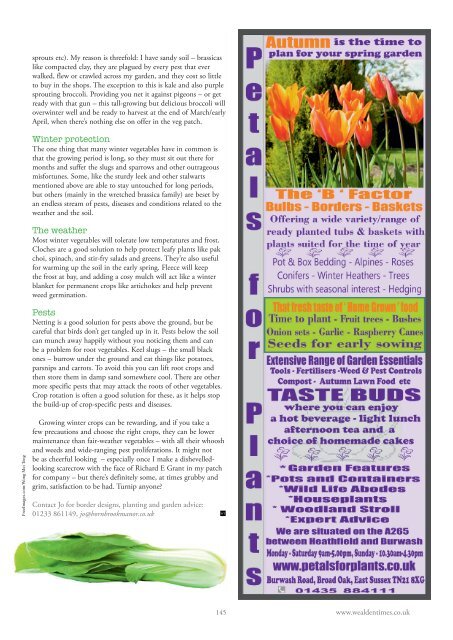Wealden Times | WT165 | November 2015 | Gift supplement inside
Wealden Times - The lifestyle magazine for the Weald
Wealden Times - The lifestyle magazine for the Weald
Create successful ePaper yourself
Turn your PDF publications into a flip-book with our unique Google optimized e-Paper software.
sprouts etc). My reason is threefold: I have sandy soil – brassicas<br />
like compacted clay, they are plagued by every pest that ever<br />
walked, flew or crawled across my garden, and they cost so little<br />
to buy in the shops. The exception to this is kale and also purple<br />
sprouting broccoli. Providing you net it against pigeons – or get<br />
ready with that gun – this tall-growing but delicious broccoli will<br />
overwinter well and be ready to harvest at the end of March/early<br />
April, when there’s nothing else on offer in the veg patch.<br />
Winter protection<br />
The one thing that many winter vegetables have in common is<br />
that the growing period is long, so they must sit out there for<br />
months and suffer the slugs and sparrows and other outrageous<br />
misfortunes. Some, like the sturdy leek and other stalwarts<br />
mentioned above are able to stay untouched for long periods,<br />
but others (mainly in the wretched brassica family) are beset by<br />
an endless stream of pests, diseases and conditions related to the<br />
weather and the soil.<br />
The weather<br />
Most winter vegetables will tolerate low temperatures and frost.<br />
Cloches are a good solution to help protect leafy plants like pak<br />
choi, spinach, and stir-fry salads and greens. They’re also useful<br />
for warming up the soil in the early spring. Fleece will keep<br />
the frost at bay, and adding a cosy mulch will act like a winter<br />
blanket for permanent crops like artichokes and help prevent<br />
weed germination.<br />
Pests<br />
Netting is a good solution for pests above the ground, but be<br />
careful that birds don’t get tangled up in it. Pests below the soil<br />
can munch away happily without you noticing them and can<br />
be a problem for root vegetables. Keel slugs – the small black<br />
ones – burrow under the ground and eat things like potatoes,<br />
parsnips and carrots. To avoid this you can lift root crops and<br />
then store them in damp sand somewhere cool. There are other<br />
more specific pests that may attack the roots of other vegetables.<br />
Crop rotation is often a good solution for these, as it helps stop<br />
the build-up of crop-specific pests and diseases.<br />
FreeImages.com/Wong Mei Teng<br />
Growing winter crops can be rewarding, and if you take a<br />
few precautions and choose the right crops, they can be lower<br />
maintenance than fair-weather vegetables – with all their whoosh<br />
and weeds and wide-ranging pest proliferations. It might not<br />
be as cheerful looking – especially once I make a dishevelledlooking<br />
scarecrow with the face of Richard E Grant in my patch<br />
for company – but there’s definitely some, at times grubby and<br />
grim, satisfaction to be had. Turnip anyone?<br />
Contact Jo for border designs, planting and garden advice:<br />
01233 861149, jo@hornbrookmanor.co.uk<br />
145 www.wealdentimes.co.uk<br />
PetalsForPlantsWT164.indd 1 07/09/<strong>2015</strong> 11:11


















